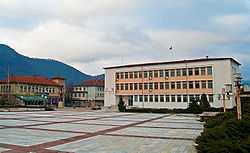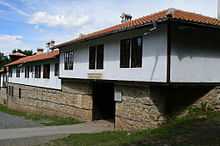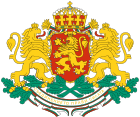Etropole
| Etropole Етрополе | ||
|---|---|---|
 | ||
| ||
 Etropole | ||
| Coordinates: 42°50′N 24°0′E / 42.833°N 24.000°ECoordinates: 42°50′N 24°0′E / 42.833°N 24.000°E | ||
| Country | Bulgaria | |
| Province (Oblast) | Sofia | |
| Government | ||
| Elevation | 618 m (2,028 ft) | |
| Population (13.09.2005) | ||
| • Total | 12,218 | |
| Time zone | EET (UTC+2) | |
| • Summer (DST) | EEST (UTC+3) | |
| Postal Code | 2180 | |
| Area code(s) | 0720 | |
Etropole (Bulgarian: Етрополе) is a town in western Bulgaria, part of Sofia Province. It is located close to the northern slopes of the Balkan Mountains in the valley of the Iskar River 80 km (49.71 mi) from Sofia.
History
The area was first settled by the Thracian tribe of the Triballi in the 7th-6th century BC due to its position as an important crossroad connecting the Danube with Macedonia and Thrace close to two key Balkan passes. The forces of Philip II of Macedon (339 BC), Alexander the Great (335 BC), the Celts and the Roman legions passed through the valley in the Antiquity. The region developed as a centre of trade and economy, as evidenced by findings of Macedonian and Greek coins, Greek ceramics, luxurious items and decorations.
The ore ledges brought Saxon miners to the town in the 16th century. They introduced the samokov hammer technology and helped for the area's establishment as a centre of craftsmanship and mining, with gold, copper, silver and iron being extracted in the 16th and 17th century. Handicrafts such as iron-, gold- and coppersmithing and cutlery prospered. The economic upsurge of the settlement aided the development of culture and education in the nearby Etropole Monastery in the period, where biblical and liturgical books were copied in a specific original calligraphic style, of which 76 hand-written volumes were preserved.
A monastery school was established in 1613 and a public one (yet still monastery) followed in 1811. One of the first school buildings in Bulgaria was constructed in 1828-1830 by merchants and rich craftsmen from Etropole. A revolutionary committee part of Vasil Levski's Internal Revolutionary Organization was founded in Etropole in 1870 in order to help the Liberation of Bulgaria from Ottoman rule. The town was liberated on 24 November 1877 by Russian forces under Joseph Vladimirovich Gourko during the Russo-Turkish War of 1877-78 and served as a governing centre for the 40-day winter march of the Balkan Mountains of the Imperial Russian Army.
Etropole Peak on Livingston Island in the South Shetland Islands, Antarctica is named after Etropole.
Places of interest

The clockwork tower of Etropole built in 1710 is one of the oldest in Bulgaria. It originally served as a defensive structure until in 1821 a master builder by the name of Dido reconstructed it as a clock tower. With its height at about 20 metres it stands above most of the buildings in the small town. The clockwork tower is one of the 100 Tourist Sites of Bulgaria along with the Monastery of the Holy Trinity and the History museum of Etropole.
Notable people
- Todor Peev (1842–1904) - revolutionary
- Hristo Yasenov (1889–1925) - poet
- Sofi Marinova - singer of Roma descent
International relations
Twin towns — Sister cities
Etropole is twinned with:
-
 Feres, Greece
Feres, Greece -
 Mozhaysk, Russia
Mozhaysk, Russia -
 Bela Palanka, Serbia
Bela Palanka, Serbia
Gallery
-
Etropole Monastery Church
-

Historical Museum (built 1853–1870)
-

Courthouse
-
Etropole Monastery of the Holy Trinity
-

Etropole Monastery of the Holy Trinity
-

Etropole Monastery Church
-

Hristo Botev school.
-
Varovitets Waterfall
External links
| Wikimedia Commons has media related to Etropole. |
| |||||




